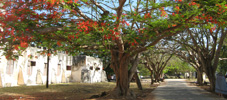
Interview of the Vice Director of the Institute Prof. Dmitri M. Bondarenko to the Embassy of Rwanda in Russia
 “I believe in a brighter future for the People of Rwanda”, Professor Dmitri Bondarenko
“I believe in a brighter future for the People of Rwanda”, Professor Dmitri Bondarenko
April 7th marks the yearly anniversary of the Rwandan genocide against the Tutsi. Within the space of one hundred days in 1994, from April to June, more than 1 million people were systematically killed in Rwanda by Rwandans in what has become known as one of the most shameful episodes of the twentieth century. Rwandans inside and outside the country, commemorate the victims of the 1994 genocide atrocities to mourn the victims and calling upon the world communities to fight against genocide denials.
In the Russian Federation, the Embassy of Rwanda organized such an event gathered around one hundred people including Embassy Diplomats and families, Diplomats accredited to the Russian Federation, Government Officials of the Russian Federation, Embassy staff, Rwandans living in Russia, students and friends of Rwanda.
Among other friends of Rwanda, Professor Dmitri Bondarenko, Vice Director, Institute for African Studies, Russian Academy of Sciences, commented on the value of commemorating genocide victims and called academicians to keep to historic truth and hence to oppose attempts of genocide denial.
Many atrocities which have ever happened in the world history are unfortunately repeated, notwithstanding many changes in world cultures and human minds. However, the tragedy that occurred in Rwanda in the twentieth century, should teach lessons to humanity. The story of Rwanda genocide can teach the world different lessons, can serve as a powerful message warning about dangers of today divisions in the world.
“I think that this tragic story and history taught and still teaches a lesson the whole humankind. Waves of hate, discrimination and exclusion ideology, whatever can destroy human life should be replaced by education on mutual tolerance, peaceful cohabitation, common efforts to social progress, and promotion of human fundamental rights”.
Prof Dmitri added that there are several preconditions that lead to such atrocities, including genocide. Any of these conditions should draw closer attention of the leadership to prevent or avoid the explosion of open violence against a group of people basing on their particularities.
Today we are witnessing lack of efficient preventive strategies and respective insufficiency of taken measures. Education, good governance, economic development program are among others things that may contribute to create a friendly and peaceful environment for all people.
As the Institute for African Studies sends heartfelt condolences to Rwandans in general and to genocide survivors during this unbearable painful period of times in particular, the world should learn from Rwanda lessons to design programs aiming at enhancing good governance, an ever inclusive one that promotes equal rights.
On the UN “Never Again” message, Prof Dmitri noted that though the history of the twenty-first century instead proved that “never again” became “again and again”, this message is still very important. “Never Again” still constitutes a core message and has its value in education to tolerance and non-violence promotion programs. History interprets facts and people prefer to be led by their thoughts, conscience and mindset, so policy makers and all other social and political actors, should play key role in shaping societies with values that sustain human rights.
Prof Dmitri commends the people of Rwanda and their Government for the key role in preventing genocide and fight against its denial. “Six years ago, I visited Rwanda. Rwandans were first to narrate about the tragedy they went through. Simple people openly narrated to every visitor. This is a positive attitude against whoever would attempt to deny the facts on genocide. Nobody else, apart from victims and perpetrators could narrate the facts; people of Rwanda would always be on the front line to strongly fight against genocide negation and revisionism”
Everybody talks about the event we are commemorating today, facts are clear. Survivors provide testimonies and witnesses are collected. Telling about it, it is very important, remove it from inside and denounce it to contribute to fight against genocide denial.
“Rwanda is doing better though there are still much to do in terms of socio-economic development; the rate of education is still low. Nevertheless, I firmly believe in a brighter future for the people of Rwanda”, continued Prof Dmitri.
“I personally praise the political peace and stability that characterizes your nation. There are very good prospects for a better future since Rwanda is steadily increasing the number of intellectual people, increasing growth in economic production, very active business people struggling to overcome the shadow of poverty...’ said the Professor
On the issue of genocide denial, Professor Bondarenko said that in a broader context, some organizations may conduct such wrong research for their own interest. Some researchers claim to have the right to publish any data, sometimes collected from uninformed sources or ill intentioned, others limit themselves on opinion, empty of facts. “My deep conviction is that tools of history should be their priority; journalists and researchers, should get acquainted with fact, otherwise, they finally betray their trust and academic profession”.
Professor Dmitri Bondarenko is the Vice Director of the Institute for African Studies, Russia Academy of Sciences. He conducted fieldwork in Rwanda in 2009.